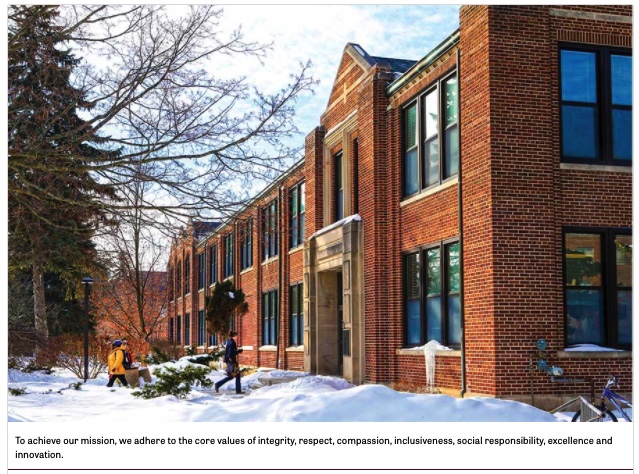Website Standards
Accessibility standards
We are committed to creating a web experience that is inclusive to all users through meeting accessibility standards.
Text and images
Do not use text on images. The text is inaccessible to people using a screen reader.
If you must use an image where text is present, be very descriptive in the alternative or alt text. Use image captions and alt text to add text related to the image.
Incorrect use of text with an image.

Correct use of text with an image.

Buttons and links
Buttons and links should be descriptive for screen readers and skimming.
- Incorrect: Read more
- Correct: Read more about ADA standards
Headings
H1 is for the Page Title widget only.
Headers should follow the appropriate hierarchy, H2-H6 and should not be bold.
Page headers play an important part in Search Engine Optimization and accessibility. While it does affect the page aesthetics, it is critical to use them properly to ensure the page functions properly.
Style standards
Page titles and headings
Headings should follow sentence case and include no punctuation.
H1 is for the Page Title widget only. Headers should follow the appropriate hierarchy, H2-H6 and should not be bold.
- Incorrect: Preparing To File Your FAFSA, Preparing to File your FAFSA!
- Exceptions include proper nouns, acronyms, and some marketing-related content.
- Correct: Preparing to file your FAFSA
Page titles need to be descriptive so they can be easily searched for on the site and to give the reader the best experience. Pages such as about, frequently asked questions, etc. should include the page topic in the title.
- Incorrect: About Us
- Correct: About the Office of Research and Graduate Studies
- Incorrect: FAQs
- Correct: Study Abroad frequently asked questions
Additional considerations:
- SEO Impact: Utilizing full titles improves visibility in search engines, making it easier for users to find relevant content related to their searches.
- User Experience: Clear and descriptive titles help visitors immediately recognize the content they are accessing, enhancing their overall experience on the site.
- Accessibility: Full titles provide essential context for users relying on assistive technologies, improving navigation and usability for individuals with disabilities, impairments, and limitations.
Contact information shouldn't be a standalone page, it should be on the department home or about page. It can also go on every page in the left-hand navigation content area.
Links
Page titles and headings should not be linked. Linked page titles and headings violate accessibility standards.
When inserting links:
- Do not use ‘Click Here’ as your call to action.
- Do not paste the direct URL into the content.
- Use a button with a call to action that describes what the user can expect when they click on the link OR
- Hyperlink text that describes what the user can expect when they click on the link.
Faculty and staff directory pages
The People widget is the standard for creating a department directory page.
- Follow the Playbook instructions for updating/editing the People profile pages.
- Follow the Playbook instructions for adding the People widget to the page that was created to be the directory.
- See an example of a faculty and staff directory page.
CMU’s AP style guidelines
Bulleted lists
- Each item in a bulleted list has the first word capitalized.
- A period is added to the end of each item in the case of sentence fragments as brief as two words, but it does not apply to lists of one-word items or personal names.
- The second-to-last bulleted item does not end with “and.”
Phone numbers
- Should be formatted xxx-xxx-xxx.
- Incorrect: (989) 774-4000
- Correct: 989-774-4000
Email addresses
- No hyphen in email or online.
- Incorrect: e-mail and on-line
- Correct: email and online
Dates
- Dates follow the format of Month Day, Year.
- Eg. Jan. 3, 2022.
- A span of years follows this format: 2021-22.
Time
- Per AP style, use lowercase a.m. and p.m.
- For example: 9:30 a.m.
Departments
- Capitalize names of Central Michigan University departments, centers and offices.
Majors and minors
- Names of majors or programs of study are lowercase.
Voice and tone
Use active voice when writing to show action and be sure to shift your tone to address serious subjects appropriately.
Using "We Do"
Using "We do" in headlines is exclusively reserved for content that speaks directly to hands-on, experiential learning for our students. When writing headlines, think carefully about your subject: Are you talking about a place or an outcome of an experience? Or are you talking about the action or actions students are completing?
If “We do” does not work as a headline, it leads to a great opportunity to infuse bold and fun branded messaging, such as a pun or a play on words.
Active voice
In active voice, the subject acts upon the verb.
In passive voice, the subject is the recipient of the verb's action.
- Active voice: Students will present their research.
- Passive voice: Research will be presented.
- Active voice: Our students get their hands on active learning opportunities.
- Passive voice: Active learning opportunities are provided to our students.
Be authentic
Make it all about "you" for the reader. Use we, our, ours instead of CMU, Central Michigan University's or the institution/university. Use you, your, yours instead of CMU students, CMU faculty or the CMU community.